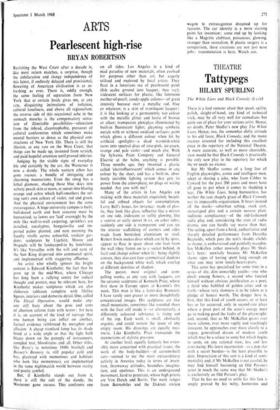The White Liars and Black Comedy (Lyric)
THEATRE
Tattypegs
HILARY SPURLING
There is a foul rumour afoot that speed, agility, polish, sleight-of-hand, any kind of technical trick, may be all very well for comedians but quite out of place for your serious artist. Hence, no doubt, Peter Shaffer's new play The White Liars. Hence, too, the somewhat shifty attitude to his old farce, Black Comedy, and the many excuses invented for including this excellent piece in the repertory of the National Theatre. A more accurate, as well as more charitable, view would be that Black Comedy is practically the only new play in the repertory for which the NT needs no excuse.
But Mr Shaffer comes of a long line of English playwrights, astute and intelligent men, adept at sharing a joke, who from Cibber to Coward for the past 200 years and more have all gone to pot when it comes to shedding a tear. The White Liars, being humourless, has neither the taut shapely grace of Black Comedy nor its impeccable organisation. It bears instead all the marks—suburban setting, stock cast, stereotyped plot and a certain morose plati- tudinous complacency—of the old-fashioned radio play and, considering the state of radio drama, one can hardly say worse than that. The acting, apart from a brisk, authoritative and sharply detailed performance from Dorothy Reynolds, which puts the text's shoddy clichés to shame, is embarrassed and painfully maudlin. Ian McKellen rather unwisely plays Mr Shaf- fer's hero : unwisely because Mr McKellen shows signs of having spent long enough on what one may term lonely-hearts-parts.
This actor has specialised for some time in a series of shy, dim unworldly youths—one who dwelt among flowers, a second who fancied himself without obvious justification as a poet, a third who babbled of golden cities and so forth—whose very slowness is to be taken as a pledge of honest worth. The danger here is, first, that this kind of youth occurs, or at least has so far occurred, only in second-rate plays where a great part of the actor's energy must go to making good the faults of the playwright; and, second, that as Mr McKellen grows ever more solemn, ever more raptly and touchingly innocent, he approaches ever more closely to a vague, generalised dream of modern youth which may be a solace to some but which begins to seem, on any rational view, less and less convincing. His latest incarnation—as a pop star with a secret burden—is the least plausible to date. Imprecision of this sort is a kind of senti- mentality and, if Mr McKellen is not careful, he may find himself becoming an Old Person's actor in much the same way that Mr Shaffer's is exclusively an Old Person's play.
That he has no need to settle for this fate is amply proved by his witty, humorous and
scrupulously accurate sketch for Harold Gor- ringe in Black Comedy, which forms the second half of this double bill. His genteel sexiness here is fairly closely based on Albert Finney's in the same role and stands up admirably to the comparison, which is more than can be said for most of the imitative performances in this blurred reproduction of a famous original. Tattypegs would no doubt be Mr Shaffer's word for it—those who saw the srr version would be well advised to follow John Dexter's lead, in a somewhat ambiguous programme note, and keep their distance. But anyone unwise enough to have missed it will find that, tattypegs or not, the play still has its pleasures.



































 Previous page
Previous page